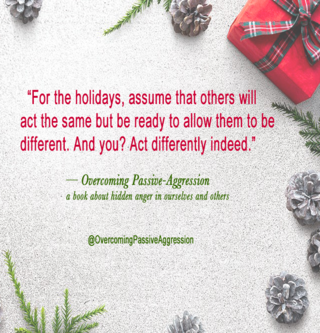Passive-Aggression
Passive-Aggressive Habits Positive People Avoid
Holiday help to circumvent ten negative behaviors and beliefs
Posted December 11, 2020 Reviewed by Lybi Ma
A Saturday Night Live (SNL) skit spotlighted the quintessential passive-aggressive pressures people employ, using the 2020 pandemic to go all scorched earth over holiday absences. Thankfully, each SNL vignette ended on a positive note rather than with gift-wrapped antagonism.1
Here are ten negative habits to avoid all year long, especially during the holidays:

Guilt trips drop unnecessary shame, all because the person using this psychological manipulation cannot articulate or handle feelings appropriately. It’s one thing to respond with “I’m disappointed you cannot be with us this year” as this respects another’s choice or dilemma with honesty.
It’s quite another to purposely or unconsciously leave others anxious or self-doubting. “Don’t you have a heart?” or “I hope you’re glad you ruined the holidays” lays needless blame upon another. Sometimes there isn’t even a true transgression, but the perception of one, akin to a cognitive error. People who veer negative often don’t check out their assumptions for any evidence for or against their thoughts and don’t substitute irrational beliefs with reasoning.
Condescension, criticism, and contempt —triple C’s of negative communication — slowly destroy relationships. Criticism and contempt are two of John Gottman’s Four Horsemen of the Apocalypse or predictors of relationship demise.2
Veer away from criticism if you intend to offer feedback. The former begins with you-statements or why questions. “You always…” or “why didn’t you…” sticks with recipients, whose listening stops at the attacks. Feedback, on the other hand, starts softly, leading with I-messages, appreciation for something, and/or a suggestion.
Sarcasm, often at the core of late-night shows, has a clever, sharp, incongruent edge. “Sarcastic comments will be funny when mutually understood within a genuine, supportive relationship or standup comedy,” my co-author and I write in Overcoming Passive Aggression.3 Sarcasm falls under the umbrella of contempt which emanates from superiority intending to put down, abuse, or insult someone.
The antidote to this verbal Judo is to say what you intend in a polite, non-reactive way. Deliver your messages congruently; that is, make sure that your body language matches your words because mixed messages may also signal passive-aggressive behavior.
Defensiveness often results when people use the tactics already discussed. However, even the best intended and well-delivered feedback or statements may be met defensively. For example, “I’m concerned when I see you, without a mask, around others” might bring about “well, you took your mask off in the grocery parking lot.” Such a response assumes critical motive, dodges discussion, and kitchen sinks it by reversing responsibility.
Another time, your friend asks you to a gathering that promises more social contact that you are comfortable with. You politely decline saying, “I’m sorry but we’re staying in for the holiday season.” Your friend, rolls her eyes uttering “fine,” or with a straight face, asks “Don’t you think we know how to be safe?”
A “why bother” attitude similarly signals that a person isn’t capable of remedying something, or that he couldn’t care less. Think Eeyore, the stroll along, unhappy donkey, in Winnie the Pooh. Slumped over with droopy head and eyes, he shows up granting too much headspace to pessimism. On the list of cognitive errors, Eeyore exhibits all-or-nothing thinking, without shades of gray, catastrophizing, and labeling most things negative as he discounts the positive.
Sometimes at the root of “why bother” is an unhealthy struggle with conflict. Guess what? Conflict exists ultimately in most relationships. That conflict exists is not—repeat not—inherently bad. It lands into the negative realm because of fear, avoidance, or lack of confidence in one’s communication or assertiveness skills. Learning to navigate conflict in a useful way is one of the best gifts you can give yourself and others. For help, read Problem Solving Your Stress Away.4

Rigid expectations ought to be jettisoned in favor of flexibility, tolerance, and greater understanding. Few dare to initiate change to a 25-year family tradition, yet check the assumption, because others may be utterly grateful. Gifts for adults could be replaced with buying only for children or drawing names to cut down on cost. Takeout certificates, grocery gift cards, or a box of new foods for the entire family to try may bring a smile and make life easier while socially distancing, juggling virtual school not to mention work. Board games grant a break from screen time and virtual summer camp certificates rather than more plastic toys might also be the ticket.
Speaking of cost, if someone asks for ideas, kindly give several options rather than forcing their hand with one suggestion that may be out of their preference or price range. We never fully know who else someone must buy for, their value system, or the fun they have selecting. “It was like he was giving me a gift, the way he accepted mine,” reads the chapter quote of the Gift of Being a Receiver in Everything I Need to Know I Learned from Mister Rogers’ Neighborhood (Clarkson Potter).5
If a giver doesn’t spend what you expected, give a genuine thank you which puts gratitude in front of negative attitude. Actually, thank folks with a phone call in this pandemic of loneliness and/or send a photo showing enjoyment or use of their gift.
Copyright @ 2020 by Loriann Oberlin. All Rights Reserved.
References
Other Holiday Help:




